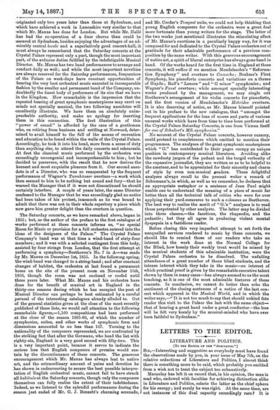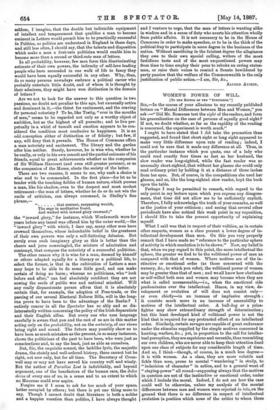LETTERS TO THE EDITOR.
LITERATURE AND POLITICS.
[To rue Eorros Os TEN ..BrscrAroa.-] Sie,—Interesting and suggestive as everybody must have found the observations made by you, in your issue of May 7th, on the relative seductions of Literature and Politics, I almost think there is something more to be said, which probably you omitted. from a wish not to treat the subject too exhaustively.
Macaulay has left it on record that, in his opinion, the man is mad who, endowed with faculties for achieving distinction alike in Literature and Politics, selects the latter as the chief sphere for his energy ; and surely he was right. At the same time, are not instances of this dual capacity exceedingly rare P It is seldom, I imagine, that the double but indivisible equipment of intellect and temperament that qualifies a man to become eminent in Letters would permit him to be practically successful in Politics, as politics are understood in England in these days, and still less often, I should say, that the talents and disposition which make a man a first-rate politician would enable him to become more than a second or third-rate man of letters.
In all probability, however, few men form this discriminating estimate of their own powers, the infirmity of self-love leading people who have succeeded in one walk of life to fancy they would have been equally successful in any other. Why, then, do so many persons nowadays embrace a political career who probably entertain little doubt, and of whom it is thought by their admirers, they might have won distinction in the domain of letters ?
Are we not to look for the answer to this question in two passions, no doubt not peculiar to this age, but unusually active and dominant in it,—the thirst for excitement, and the craving for personal notoriety ? To be, like Toetig, " ever in the months of men," seems to be regarded not only as a worthy object of ambition, but as the highest of all pursuits; and to live per- petually in a whirl of tumult and emotion appears to be con- sidered the condition most conducive to happiness. It is an odd conception either of distinction or of felicity; but few, if any, will deny that it prevails. The House of Commons offers a man notoriety and excitement. The library and the garden offer him neither. Surely, however, he is wise who, whether he be really, or only in his own conceit and the partial estimate of his friends, equal to great achievements whether as the companion of Sir William Harcourt (and even still greater persons), or as the companion of the Muses, elects the society of the latter.
There are two reasons, it seems to me, why such a choice is wise and to be commended. In the first place—for let us be tender with the touching foibles of human nature, which pursue a man, like his shadow, even to the deepest and most modest retirement—the man of letters, whether he do or do not win the smile of criticism, can always command, in Shelley's fine phrase,—
St that content, surpassing wealth, The sage in meditation found,
And walked with inward glory crowned ;"
the "inward glory," for instance, which Wordsworth wore for years before any laurel was offered him by the outer world,—the " inward glory " with which, I dare say, many other men have crowned themselves, whose indomitable belief in the greatness of their own powers was only a self-flattering delusion. But surely even such imaginary glory as this is better than the cheers and jeers commingled, the mixture of admiration and contempt, that compose the notoriety of a successful politician.
The other reason why it is wise for a man, deemed by himself or others adapted equally for a literary or a political life, to select the former, is that in the cultivation of Lettere a man may hope to be able to do some little good, and can make certain of doing no harm ; whereas no politicians, who " look before and after," can feel absolutely confident they are not sowing the seeds of public woe and national mischief. Will any really dispassionate person affirm that it is absolutely certain that, for example, the adoption of Free-trade, or the passing of our several Electoral Reform Bills, will in the long- run prove to have been to the advantage of the Realm P I entirely concur in all the Spectator has so ably and so dis- interestedly written concerning the policy of the Irish Separatists and their English allies. But every one who uses language carefully is aware that you and the rest of us are in this matter acting only on the probability, not on the certainty, of our views being right and sound. The future may possibly show us to have been as much mistaken as the present, in so many instances, shows the politicians of the past to have been, who were just as conscientious and, to say the least, just as able as ourselves.
But, Sir, the exquisite sonnet, the larklike lyric, the majestic drama, the stately and well-ordered history, these cannot but be right, not now only, but for all time. The Secretary of Crom- well may or may not have served his country well and wisely. But the author of Paradise Lost is indubitably, and beyond argument, one of the benefactors of the human race, the duke decal, of every one of us, in a sense and to an extent to which no Mascenas could ever aspire.
Forgive me if I seem to ask for too much of your space, better occupied by others ; but there is yet one thing more to say. Though I cannot doubt that literature is both a nobler and a happier vocation than politics, I have always thought and I venture to urge, that the man of letters is wanting able in wisdom and in a sense of duty who averts his attention wholly from public affairs. It is not necessary to be in the House of Commons in order to make speeches, or to be in the thick of the political fray to participate in some degree in the business of the nation. Without sacrificing in the faintest degree the allegiance they owe to their own special calling, writers of the most fastidious taste and of the most unquestioned powers may from time to time employ their pens to rebuke an erring states- man, or raise their voices to remind a Senate bewildered by party passion that the welfare of the Commonwealth is the only justification of public action.—I am, Sir, &c., ALFRED Auszur.



































 Previous page
Previous page